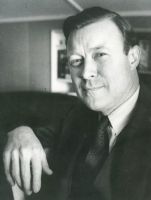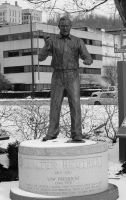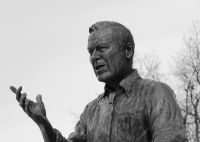
Biography: Walter Reuther
 Born in Wheeling on September 1, 1907, fittingly just one day before Labor Day, Walter P. Reuther (1907-1970), became one of the most innovative, influential and charismatic labor leaders of the 20th Century. Walter Reuther’s father, Valentine Reuther, was influential in developing a sense of social justice, leadership and activism in his four sons and daughter from an early age. While other children were sent outside to play, the Reuther children were sent to the library to do research for an upcoming kitchen table debate on the issues of the day including women’s suffrage, child labor laws, capital punishment, partisan politics, and most importantly – labor rights.
Born in Wheeling on September 1, 1907, fittingly just one day before Labor Day, Walter P. Reuther (1907-1970), became one of the most innovative, influential and charismatic labor leaders of the 20th Century. Walter Reuther’s father, Valentine Reuther, was influential in developing a sense of social justice, leadership and activism in his four sons and daughter from an early age. While other children were sent outside to play, the Reuther children were sent to the library to do research for an upcoming kitchen table debate on the issues of the day including women’s suffrage, child labor laws, capital punishment, partisan politics, and most importantly – labor rights.
On May 26, 1937, Mr. Reuther and his union colleagues were peacefully handing out organizing leaflets at the Ford Motor Company’s River Rouge Plant in Michigan when they were brutally attacked by the company thugs. Photographs of the bloodied, but not beaten, Reuther and his friends were seen around the country and resulted in a huge public relations victory for the tough labor leader from Wheeling. In 1946, Walter Reuther became the president of the United Auto Workers (UAW) and in 1952 became the president of the Congress of Industrial Organizations (CIO). As president of the UAW from 1946-1970, Walter Reuther achieved a great deal for his fellow workers. Under Reuther’s leadership, the autoworkers standard of living doubled. In 1963, Reuther was one of the few non-African American speakers at the historic March on Washington. He marched with Dr. Martin Luther King Jr. in Selma and was referred to as “The White Martin Luther King.” Reuther had weekly meetings with President Lyndon Johnson to discuss ways to help the less fortunate Americans. Beginning in May 1965, Reuther began pressing President Johnson to accept new technologies such as prefabricated housing to redesign much of urban American. Reuther hoped to provide safe, affordable and desegregated housing to the poorest Americans.
Supporting a lifetime of achievements was Walter Reuther’s personal philosophy that “There is no greater calling than to serve your fellow man. There is no greater contribution than to help the weak. There is no greater satisfaction than to have done it well.”
Through collaborative effort among the United Auto Workers, the City of Wheeling, and the Wheeling National Heritage Area Corporation, a monument honoring Walter Reuther stands at Heritage Port.
(text by Brent Carney from Legendary Locals of Wheeling)
Walter Reuther Monument at Heritage Port
The Walter P. Reuther Memorial was dedicated October 12, 2006, at Heritage Port in Wheeling.
The seven foot bronze statue of Walter Reuther was created by sculptor Alan Cottrill of Zanesville, Ohio. Inscribed on the granite pedestal it stands upon are the words of Reuther himself: “There is no greater calling than to serve your fellow man. There is no greater contribution than to help the weak. There is no greater satisfaction than to have done it well.”
 |
 |
 |
 |
(Photographs by Seán Duffy)
▶ Return to Walter Reuther Biography









 Want to keep up with all the latest Library news and events?
Want to keep up with all the latest Library news and events?